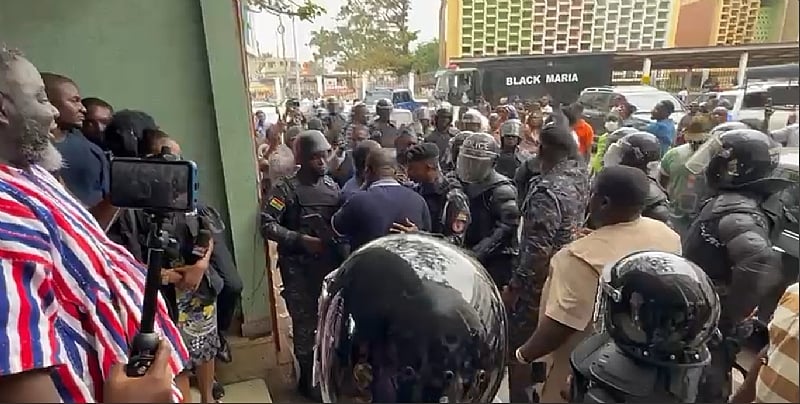The arrest of Kwame Baffoe, popularly known as Abronye DC, the Bono Regional Chairman of the New Patriotic Party (NPP), has ignited a firestorm of controversy in Ghana, escalating political tensions and raising concerns about the potential misuse of state power against political opponents. Abronye’s detention stems from allegations of insulting the Inspector General of Police, Christian Tetteh Yohunu, a charge that has sparked outrage within the NPP and fueled accusations of politically motivated persecution by the Mahama administration. This incident has become a focal point in the ongoing power struggle between the ruling party and the opposition, casting a long shadow over the upcoming 2026 elections.
The NPP has vehemently condemned Abronye’s arrest, characterizing it as a blatant attempt to suppress dissent and intimidate political rivals. They argue that the Mahama administration is systematically weaponizing state security apparatus to silence critical voices and create an atmosphere of fear and repression. The party leadership has issued stern warnings against this perceived “emerging tyranny,” urging Ghanaians to resist what they see as a dangerous erosion of democratic principles. This narrative of political persecution resonates deeply within the NPP’s base, further polarizing the political landscape and intensifying the animosity between the two major parties.
The court appearance of Abronye DC on Friday, September 12th, transformed into a dramatic public display of support and protest. Hundreds of NPP loyalists, including prominent party executives and former members of parliament, converged on the Accra Circuit Court, demanding his immediate release. The scene outside the courthouse was charged with emotion, as supporters chanted slogans, waved placards, and openly accused the police of acting on political instructions. This public demonstration of solidarity underscored the depth of feeling within the NPP regarding Abronye’s arrest and the broader issue of alleged political persecution.
Despite the fervent appeals and the tense atmosphere, the court ruled to remand Abronye into custody, a decision that further inflamed tensions. He was subsequently transported away in a heavily guarded police vehicle, a visual that has been widely circulated and interpreted as a symbol of the government’s heavy-handed tactics. Abronye’s legal team has indicated their intention to challenge the court’s decision, setting the stage for a protracted legal battle that will likely further fuel the political firestorm. This legal challenge will be closely watched by both sides of the political divide and is likely to become a key battleground in the ongoing struggle for political dominance.
The NPP views this incident as part of a larger pattern of intimidation and harassment designed to weaken the opposition ahead of the 2026 elections. They argue that the government is attempting to create a climate of fear and self-censorship, discouraging open criticism and dissent. This perceived strategy of suppression is seen as a direct threat to the democratic process and the fundamental right to freedom of expression. The NPP’s strong reaction to Abronye’s arrest signifies their resolve to resist what they perceive as an authoritarian drift and to protect their members from what they consider to be politically motivated prosecution.
The arrest of Abronye DC has become a highly symbolic event in Ghana’s political landscape, crystallizing existing tensions and raising profound questions about the rule of law and the protection of fundamental rights. The incident has intensified the political polarization in the country, with the NPP accusing the government of authoritarianism and the government maintaining that it is simply upholding the law. The coming months will be crucial in determining how this situation unfolds and whether it will further escalate tensions as the country heads towards the 2026 elections. The outcome of Abronye’s legal challenge and the government’s subsequent actions will be closely scrutinized by both domestic and international observers, as they will likely have a significant impact on the political climate and the future of democratic discourse in Ghana.


